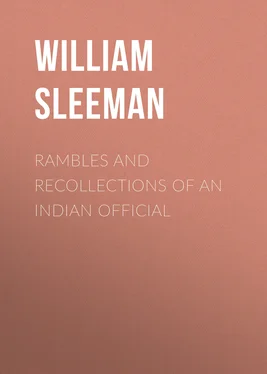William Sleeman - Rambles and Recollections of an Indian Official
Здесь есть возможность читать онлайн «William Sleeman - Rambles and Recollections of an Indian Official» — ознакомительный отрывок электронной книги совершенно бесплатно, а после прочтения отрывка купить полную версию. В некоторых случаях можно слушать аудио, скачать через торрент в формате fb2 и присутствует краткое содержание. Жанр: Путешествия и география, История, foreign_edu, foreign_antique, foreign_prose, на английском языке. Описание произведения, (предисловие) а так же отзывы посетителей доступны на портале библиотеки ЛибКат.
- Название:Rambles and Recollections of an Indian Official
- Автор:
- Жанр:
- Год:неизвестен
- ISBN:нет данных
- Рейтинг книги:4 / 5. Голосов: 1
-
Избранное:Добавить в избранное
- Отзывы:
-
Ваша оценка:
- 80
- 1
- 2
- 3
- 4
- 5
Rambles and Recollections of an Indian Official: краткое содержание, описание и аннотация
Предлагаем к чтению аннотацию, описание, краткое содержание или предисловие (зависит от того, что написал сам автор книги «Rambles and Recollections of an Indian Official»). Если вы не нашли необходимую информацию о книге — напишите в комментариях, мы постараемся отыскать её.
Rambles and Recollections of an Indian Official — читать онлайн ознакомительный отрывок
Ниже представлен текст книги, разбитый по страницам. Система сохранения места последней прочитанной страницы, позволяет с удобством читать онлайн бесплатно книгу «Rambles and Recollections of an Indian Official», без необходимости каждый раз заново искать на чём Вы остановились. Поставьте закладку, и сможете в любой момент перейти на страницу, на которой закончили чтение.
Интервал:
Закладка:
Their land produce is conveyed upon the backs of bullocks, that move at the rate of six or eight miles a day, and add one hundred per cent. to the cost of every hundred miles they carry it in the best seasons, and more than two hundred in the worst. 314What in Europe is felt merely as a dearth , becomes in India, under all these disadvantages, a scarcity, and what is there a scarcity becomes here a famine . Tens of thousands die here of starvation, under calamities of season, which in Europe would involve little of suffering to any class. Here man does everything, and he must have his daily food or starve. In England machinery does more than three-fourths of the collective work of society in the production, preparation, and distribution of man's physical enjoyments, and it stands in no need of this daily food to sustain its powers; they are independent of the seasons; the water, fire, air, and other elemental powers which they require to render them subservient to our use are always available in abundance.
This machinery is the great assistant of the present generation, provided for us by the wisdom and industry of the past; wanting no food itself, it can always provide its proprietors with the means of purchasing what they require from other countries, when the harvests of their own fail. When calamities of season deprive men of employment for a time in tillage, they can, in England, commonly find it in other branches of industry, because agricultural industry forms so small a portion of the collective industry of the nation; and because every man can, without prejudice to his status in society, take to what branch of industry he pleases. But, when these calamities of season throw men out of employment in tillage for a time in India, they cannot find it in any other branch, because agricultural industry forms so very large a portion of the collective industry of every part of the country; and because men are often prevented by the prejudices of caste from taking to that which they can find. 315
In societies constituted like that of India the trade of the corn- dealer is more essentially necessary for the welfare of the community than in any other, for it is among them that the superabundance of seasons of plenty requires most to be stored up for seasons of scarcity; and if public functionaries will take upon themselves to seize such stores, and sell them at their own arbitrary prices, whenever prices happen to rise beyond the rate which they in their short-sighted wisdom think just, no corn-dealer will ever collect such stores. Hitherto, whenever grain has become dear at any military or civil station, we have seen the civil functionaries urged to prohibit its egress—to search for the hidden stores, and to coerce the proprietors to the sale in all manner of ways; and, if they do not yield to the ignorant clamour, they are set down as indifferent to the sufferings of their fellow creatures around them, and as blindly supporting the worst enemies of mankind in the worst species of iniquity.
If those who urge them to such measures are asked whether silversmiths or linendrapers, who should be treated in the same manner as they wish the corn-dealers to be treated, would ever collect and keep stores of plate and cloth for their use, they readily answer—No; they see at once the evil effects of interfering with the free disposal of the property of the one, but are totally blind to that which must as surely follow any interference with that of the other, whose entire freedom is of so much more vital importance to the public. There was a time, and that not very remote, when grave historians, like Smollett, could, even in England, fan the flame of this vulgar prejudice against one of the most useful classes of society. That day is, thank God, past; and no man can now venture to write such trash in his history, or even utter it in any well-informed circle of English society; and, if any man were to broach such a subject in an English House of Commons, he would be considered as a fit subject for a madhouse.
But some, who retain their prejudices against corn-dealers, and are yet ashamed to acknowledge their ignorance of the first principles of political economy, try to persuade themselves and their friends that, however applicable these may be to the state of society in European or Christian countries, they are not so to countries occupied by Hindoos and Muhammadans. This is a sad delusion, and may be a very mischievous one, when indulged by public officers in India. 316
CHAPTER 25
In the evening, after my conversation with the cultivator upon the wall that united the two hills, 317I received a visit from my little friend the Sarīmant. His fine rose-coloured turban is always put on very gracefully; every hair of his jet-black eyebrows and mustachios seems to be kept always most religiously in the same place; and he has always the same charming smile upon his little face, which was never, I believe, distorted into an absolute laugh or frown. No man was ever more perfectly master of what the natives call 'the art of rising or sitting' ( nishisht wa barkhāst ), namely, good manners. I should as soon expect to see him set the Nerbudda on fire as commit any infringement of the convenances on this head established in good Indian society, or be guilty of anything vulgar in speech, sentiment, or manners. I asked him by what means it was that the old queen of Sāgar 318drove out the influenza that afflicted the people so much in 1832, while he was there on a visit to me. He told me that he took no part in the ceremonies, nor was he aware of them till awoke one night by 'the noise, when his attendants informed him that the queen and the greater part of the city were making offerings to the new god, Hardaul Lāla. He found next morning that a goat had been offered up with as much noise as possible, and with good effect, for the disease was found to give way from that moment. About six years before, when great numbers were dying in his own little capital of Pithoria 319from a similar epidemic, he had, he said, tried the same thing with still greater effect; but, on that occasion, he had the aid of a man very learned in such matters. This man caused a small carriage to be made up after a plan of his own, for a pair of scape-goats , which were harnessed to it, and driven during the ceremonies to a wood some distance from the town, where they were let loose. From that hour the disease entirely ceased in the town. The goats never returned. 'Had they come back,' said Sarīmant, 'the disease must have come back with them; so he took them a long way into the wood—indeed (he believed), the man, to make sure of them, had afterwards caused them to be offered up as a sacrifice to the shrine of Hardaul Lāla, in that very wood. He had himself never seen a pūjā (religious ceremony) so entirely and immediately efficacious as this, and much of its success was, no doubt, attributable to the science of the man who planned the carriage, and himself drove the pair of goats to the wood. No one had ever before heard of the plan of a pair of scape- goats being driven in a carriage; but it was likely (he thought) to be extensively adopted in future.' 320
Sarīmant's man of affairs mentioned that when Lord Hastings took the field against the Pindhārīs, in 1817, 321and the division of the grand army under his command was encamped near the grove in Bundēlkhand, where repose the ashes of Hardaul Lāla, under a small shrine, a cow was taken into this grove to be converted into beef for the use of the Europeans. The priest in attendance remonstrated, but in vain—the cow was killed and eaten. The priest complained, and from that day the cholera morbus broke out in the camp; and from this central point it was, he said, generally understood to have spread all over India. 322The story of the cow travelled at the same time, and the spirit of Hardaul Lāla was everywhere supposed to be riding in the whirlwind, and directing the storm . Temples were everywhere erected, and offerings made to appease him; and in six years after, he had himself seen them as far as Lahore, and in almost every village throughout the whole course of his journey to that distant capital and back. He is one of the most sensible and freely spoken men that I have met with. 'Up to within the last few years', added he, 'the spirit of Hardaul Lāla had been propitiated only in cases of cholera morbus; but now he is supposed to preside over all kinds of epidemic diseases, and offerings have everywhere been made to his shrine during late influenzas.' 323
Читать дальшеИнтервал:
Закладка:
Похожие книги на «Rambles and Recollections of an Indian Official»
Представляем Вашему вниманию похожие книги на «Rambles and Recollections of an Indian Official» списком для выбора. Мы отобрали схожую по названию и смыслу литературу в надежде предоставить читателям больше вариантов отыскать новые, интересные, ещё непрочитанные произведения.
Обсуждение, отзывы о книге «Rambles and Recollections of an Indian Official» и просто собственные мнения читателей. Оставьте ваши комментарии, напишите, что Вы думаете о произведении, его смысле или главных героях. Укажите что конкретно понравилось, а что нет, и почему Вы так считаете.












